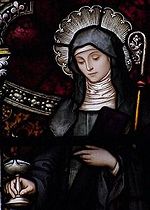Portal:Catholic Church/Patron Archive/February 1: Difference between revisions
No edit summary |
Add see also wikilink |
||
| (10 intermediate revisions by 5 users not shown) | |||
| Line 1: | Line 1: | ||
{{Portal:Catholic Church/Patron/Layout |
|||
|image=stbrigid.jpg |
|||
'''Saint Brigid of Kildare''' or '''Brigid of Ireland''' (Brigit, Bridget, Bridgit, Bríd or Bride) ([[Irish language|Irish]]: ''Naomh Bhríde'') (c. [[451]] – [[525]]) was an [[Ireland|Irish]] Christian [[nun]], abbess, and founder of several convents who is venerated as a [[saint]]. |
|||
|size= |
|||
|caption=Saint Bridgit of Kildare |
|||
Brigid was born at [[Faughart]] near [[Dundalk]], [[County Louth]], Ireland. According to her biographers her parents were Dubhthach, a [[Paganism|pagan]] chieftain of [[Leinster]], and Brocca, a Christian [[Picts|Pictish]] slave who had been baptized by [[Saint Patrick]]. She was inspired by the preaching of Saint Patrick from an early age. Despite her father's opposition she was determined to enter religious life. |
|||
| ⚫ | |||
|link=Brigid of Kildare |
|||
Brigid received the veil from [[Saint Mel]] and professed vows dedicating her life to [[Christ]]. She is believed to have founded a convent in [[Clara]], [[County Offaly]] - her first: other foundations followed. Around 470 she founded [[Kildare Abbey]], a double [[monastery]], for nuns and monks, on the plains of ''Cill-Dara'', "the church of the oak", her cell being made under a large oak tree. As Abbess of this foundation she wielded considerable power. Legends surround her, even her blessing as Abbess by [[Saint Mel]] has a story attached to it. According to the legend, the elderly bishop, as he was blessing her during the ceremony, inadvertently read the rite of consecration of a bishop and that this could not be rescinded, under any circumstances. Brigid and her successor Abbesses at [[Kildare]] had an administrative authority equal to that of a Bishop until the [[Synod of Kells]] in 1152. |
|||
| ⚫ | |||
| ⚫ | |Patronage=babies; blacksmiths; boatmen; cattle; chicken farmers; children whose parents are not married; dairymaids; dairy workers; fugitives; infants; Ireland; Leinster, Ireland; mariners; midwives; milk maids; newborn babies; nuns; poets; poultry farmers; poultry raisers; printing presses; sailors; scholars; travellers; watermen <br />'''See also:''' [[Henry Morse]], England |
||
She died at [[Kildare]] around 525 and was buried in a tomb before the high altar of her abbey church. After some time her remains were exhumed and translated to [[Downpatrick]] to rest with the two other patron saints of [[Ireland]], Patrick and Columba (Columcille). Her skull was extracted and brought to Igreja de Sao Joao Baptista (Lumiar) [[Lisbon]], [[Portugal]] by three Irish noblemen, where it remains. There is widespread devotion to her in Ireland where she is known as the "Mary of the Gael" and her cult was brought to [[Europe]] by Irish missionaries, such as [[Foillan]], in the centuries after her death. In [[Belgium]] there is a chapel (7th-10th century) dedicated to Sainte-Brigide at [[Fosses-la-Ville]]. |
|||
}} |
|||
| ⚫ | |||
| ⚫ | |||
| ⚫ | |||
Latest revision as of 15:28, 27 August 2020
Saint Brigid of Kildare or Saint Brigid of Ireland (Irish: Naomh Bríd; Classical Irish: Brighid; Latin: Brigida; c. 451 – 525) is the patroness saint (or 'mother saint') of Ireland, and one of its three national saints along with Patrick and Columba. According to medieval Irish hagiographies, she was an abbess who founded the important abbey of Kildare (Cill Dara), as well as several other monasteries of nuns. There are few documented historical facts about her, and her hagiographies are mainly anecdotes and miracle tales, some of which are Christianisations of hero tales from Irish mythology. They say Brigid was the daughter of an Irish clan chief and an enslaved Christian woman, and was fostered in a druid's household before becoming a consecrated virgin. She is patroness of many things, including poetry, learning, healing, protection, blacksmithing, livestock and dairy production. In her honour, a perpetual fire was kept burning at Kildare for centuries.
Some historians suggest that Brigid is a Christianisation of the Celtic goddess Brigid. The saint's feast day is 1 February, and traditionally it involves weaving Brigid's crosses and many other folk customs. It was originally a pre-Christian festival called Imbolc, marking the beginning of spring. From 2023 it is a public holiday in the Republic of Ireland. This feast day is shared by Dar Lugdach, who tradition says was her student, close companion, and successor. (Full article...)
Prayer: "Christus in nostra insula Que vocatur Hivernia Ostensus est hominibus Maximis mirabilibus Que perfecit per felicem Celestis vite virginem Precellentem pro merito Magno in numdi circulo."
Attributes: an abbess with a shepherd's staff and flames over her head, with a lamp or candle, sometimes with a cow, ducks or gooses
Patronage: babies; blacksmiths; boatmen; cattle; chicken farmers; children whose parents are not married; dairymaids; dairy workers; fugitives; infants; Ireland; Leinster, Ireland; mariners; midwives; milk maids; newborn babies; nuns; poets; poultry farmers; poultry raisers; printing presses; sailors; scholars; travellers; watermen
See also: Henry Morse, England

